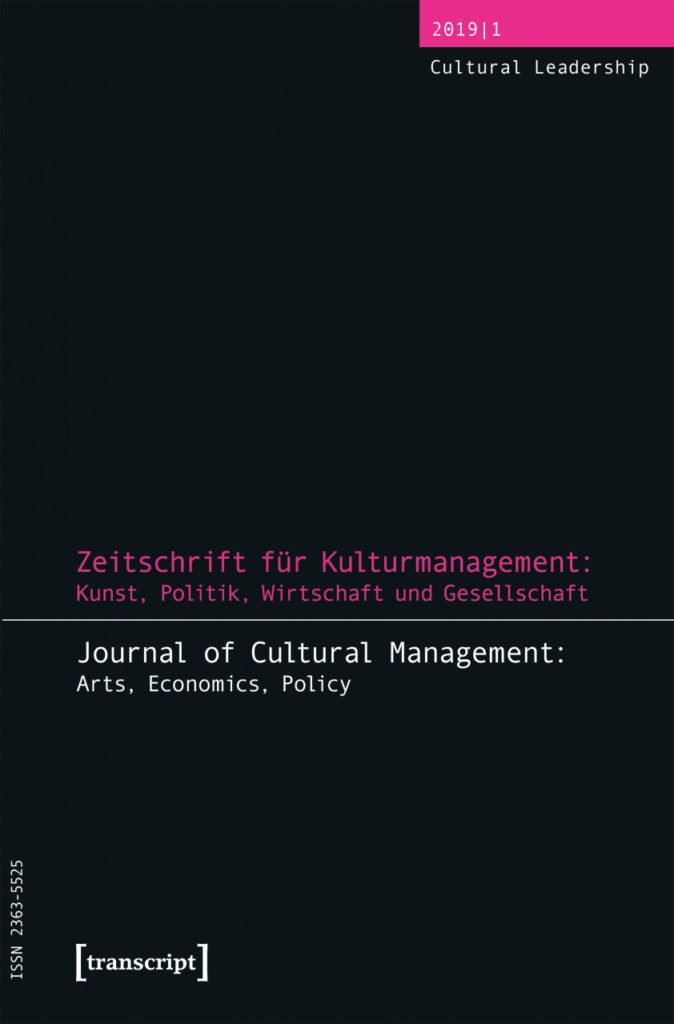Introduction
Cultural Leadership
Die Bedeutung von ‚Cultural Leadership‘, Schwerpunktthema des aktuellen Heftes der Zeitschrift für Kulturmanagement, ergibt sich vor allem aus den internationalen Diskursen um Kulturmanagement, Kulturpolitik, Kulturwissenschaften und Kultursoziologie, in denen sich seit einigen Jahren eine wachsende Bedeutung dieses Begriffspaars beobachten lässt, …
Read More-
Journal of Cultural Management 2019 (1)
http://dx.doi.org/10.14361/zkmm-2019-0101
Research Article
Abstract
Using the theory of stakeholder salience and stakeholder discourse, this article questions the effect of arts policy bodies on the way the cultural sector assigns leadership. It argues that in satisfying the demands of risk-averse public management, arts policy bodies implicitly and explicitly impose the role of sectoral leader on the heads of largest best-funded cultural organisations. As a result, opportunities for alternate forms of leadership to emerge outside organisations are restricted. It renders organisational leaders in conflicting obligations to multiple stakeholders – their funders, their organisations and their sector – and exposes implicit perceptions of value. Finally, in reinforcing existing organisational structures, imposed leadership inhibits the risk- taking and innovation these same arts policy bodies promote in their strategies. This prevents the emergence of more transgressive forms of leadership and innovative cultural production and affects the ability of artists to be perceived as leaders. Consequently, artists’ sectoral and policy influence is diminished and their precarity and inequality reinforced at a structural level. While focused on subsidised theatre in the UK, this research offers wider implications for how we understand policy influence on ethical leadership behaviours in the cultural sector.
Journal of Cultural Management 2019 (1)
http://dx.doi.org/10.14361/zkmm-2019-0102
- “Best Essay” Award 2019
Essay
Journal of Cultural Management 2019 (1)
http://dx.doi.org/10.14361/zkmm-2019-0103
Essay
Abstract
This essay highlights the relation of cultural leadership at supranational level with instrumentalisation of culture using key funding schemes and cultural policy and diplomacy documents within the process of making and breaking of Europe. Following the development of the EU cultural policy agenda since 1990, it discusses the role and use of culture as an instrument of influence and highlights how it serves as a means for the European Union to exercise power and assert a leading position in the European and global arena.
Journal of Cultural Management 2019 (1)
http://dx.doi.org/10.14361/zkmm-2019-0104
-
Abstract
In this essay I pursue the idea about what “decolonizing art institutions” can mean and draw on some examples coming from São Paulo, where I am from. Taking the discussions about institutional critique as starting point, this essay points out how we can learn from artistic practices in order to think about power relations and mechanisms of cultural institutional operation. Thinking that the institution itself, as apparatus, already translates Eurocentric epistemologies, it also seeks to present new perspectives on integrating Southern perspectives into its processes. Lastly, the essay brings the concepts of “communing” and “permeability” into the practice and structure of cultural institutions’ modus operandi and provokes: how we can incorporate themes and topics from critical artistic perspective to propose new ways of acting and feeling inside institutional practice?
Journal of Cultural Management 2019 (1)
http://dx.doi.org/10.14361/zkmm-2019-0105
-
Journal of Cultural Management 2019 (1)
http://dx.doi.org/10.14361/zkmm-2019-0106
Research Article
Abstract
Natural Language Processing (NLP) opens up new possibilities for arts management in practice and research. This article introduces the typical research process of NLP and presents the most important methods and techniques like Sentiment Analysis, Author Profiling, Named Entity Recognition, Topic Modeling and Trend Detection. Using recent research results and new illustrative examples, we describe the possibilities and limitations of NLP for arts management.
Journal of Cultural Management 2019 (1)
http://dx.doi.org/10.14361/zkmm-2019-0107
-
Journal of Cultural Management 2019 (1)
http://dx.doi.org/10.14361/zkmm-2019-0108
-
Journal of Cultural Management 2019 (1)
http://dx.doi.org/10.14361/zkmm-2019-0109
Book Review
Journal of Cultural Management 2019 (1)
http://dx.doi.org/10.14361/zkmm-2019-0110
Book Review
Journal of Cultural Management 2019 (1)
http://dx.doi.org/10.14361/zkmm-2019-0111
-
Journal of Cultural Management 2019 (1)
http://dx.doi.org/10.14361/zkmm-2019-0112
-
Journal of Cultural Management 2019 (1)
http://dx.doi.org/10.14361/zkmm-2019-0113
© 2026, Journal of Cultural Management and Cultural Policy
Keywords
- Aesthetics
- Higher Education
- Cultural Diplomacy and Foreign Cultural Policy
- Occupation
- Career and Professional Role
- Audience Development
- Audience Studies and Visitor Studies
- Visitor Motivations
- Business
- Covid Pandemic
- Democracy
- Digitalization
- Diversity
- Third Sector
- Empirical Aesthetics
- Development
- Ethics
- Evaluation
- Field Theory
- Festival
- Film
- Federalism
- Community Arts
- Societal Change
- Ideology
- Staging
- Career
- Communication
- Concert
- Creative Industries
- Creativity
- Crisis
- Culture
- arts organizations, cultural organizations
- Cultural Participation
- Cultural Change
- Fincancing The Arts
- Cultural Promotion Law
- Cultural History
- Cultural Management
- Cultural Economy
- Cultural Organizations
- Art Education
- Cultural Policy
- Cultural Production
- Cultural Sociology
- Art Education
- Cultural Understanding
- Arts Administration
- Cultural Industry
- Cultural Sciences
- Art
- Art Field
- Arts Research
- Artists
- Artistic Research
- Artistic Reputation
- Arts Management
- Arts Organizations
- Art education
- Arts Marketing
- Arts Administration
- Curating
- Leadership
- Literature
- Advocacy
- Management
- Marketing
- Market
- Media
- Methods Development
- Mexico
- Monumentalizing
- Museum
- Music
- Non-Visitor Studies
- Opera
- Orchestra
- Organization
- Political Expression
- Post-truth Politics
- Professional Role
- Audience
- Audience Development
- Law
- Government
- Role
- Socially Engaged Art
- Social Cohesion
- Social Change
- Social Cohesion
- Non-visitor Socio-demographics
- Socioculture
- State
- Symbolic capital
- Dance
- Participatory Justice
- Theatre
- Theatre Governance
- Theory Development
- Tourism
- Transformation
- Survey
- Entrepreneurship
- Urbanism
- Civil Society




